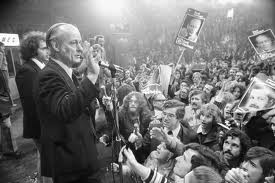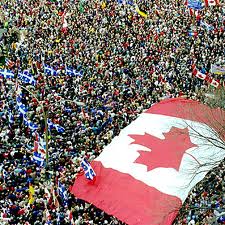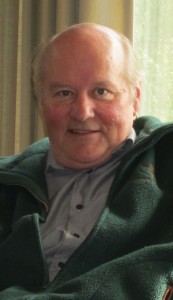By Ray Rivers
BURLINGTON, ON. Pierre Trudeau was the father of multiculturalism, and in 1971 Canada became the first nation in the world to adopt that policy. Coming off the October 1970 FLQ crisis, Trudeau needed something to bridge the two solitudes, which Canada had become, and which made fertile ground for the separatists to argue for independence. Inclusion of Canadians regardless of their origins, respect for their cultural heritage and the richness that comes with diverse cultural backgrounds helped change the focus of minority rights in Canada and Quebec.
Multiculturalism is fundamentally a liberal philosophy – the right of individuals to freely express themselves and pursue their conceptions of the good life. The Liberal Party subscribes to it, so it shouldn’t be any surprise that Justin Trudeau immediately rejected Marois’ proposed charter. But conservatives also subscribe to this philosophy, particularly the more libertarian wing, though they are conflicted by their desire for control. For that and other reasons the PM is mostly staying out of the discussion at this time – but he’ll have to find his tongue if, and when, the Charter sees the light of day.

The night Rene Levesque lost the first referendum in Quebec. The province would try a second time to leave the country in 1995.
The NDP are socialists and have little time for religion or religious symbols, although Mulcair appears to be siding with Trudeau – but then he used to be a Liberal. The Parti Québécois (PQ) is also a socialist party and favours secularism. They still remember the Duplessis years and how the Church helped to oppress Quebecers – je me souviens. And, of course, the PQ prefer any policy which would enable them to reach their end-goal of independence.
Quebec has always been opposed to multiculturalism. Half a century after it became national policy, Quebec’s minority government is proposing a ‘Charter of Quebec Values’, a racist, at least in the broadest sense of the word, attempt at shutting multiculturalism down. Much like the French Language Charter, Bill 101, introduced in 1977 by René Lévesque, the proposed charter Pauline Marois is proposing discriminates against those who are different – those who threaten the notion of a distinct society in the nation of Quebec.
It is just another brick in the wall for the separatists – a wall to further divide Quebec from the rest of Canada. Former premier Jacques Parizeau blamed the ethnic minority in Quebec for the narrow defeat of his 1995 referendum on sovereignty. Premier Marois claims her goal is to unite Quebecers, a euphemism for stripping them of their individuality and re-engineering Quebec to deal with Parizeau’s complaint.
Pierre Trudeau discovered multiculturalism in the recommendations of the Royal Commission on Bilingualism and Biculturalism (1963). And Ms. Marois has a commission of her own, The Bouchard-Taylor Report on Cultural and Religious Accommodation. If we thought multiculturalism was a complex topic, Taylor and Bouchard promote an even more complicated hybrid called ‘interculturalism‘.
A nation with diverse cultures is not one that rallies predictably for a common cause, such as Quebec sovereignty. So Premier Marois wants to instill Quebecers with a set of common values before the next referendum. If she needed a model, she might have looked to the Japan of the shogun era. For over 200 years the Japanese people were isolated from foreign influences; foreigners were expelled and their religions banned; trade and contact with the outside world was restricted; and a common language and social mores were forced on the people. The results of that unification process were impressive as we saw in the Second World War.
Europe, like Canada, once embraced multiculturalism, so much that chicken tikka masala has replaced fish and chips Chips as England’s most popular dish. However, Europeans, like some folks in Quebec, are concerned about the impending clash they envision with their traditional cultures. France is in the forefront of the fight against religious symbols, though the French government is perhaps more worried about ethnic ghettos, where streets and even suburbs have become enclaves and no-go zones.
Of course that isn’t the case for Quebec which has less ethnic diversity than B.C. or even Ontario. Toronto is now the most ethnically diverse city in the world. Quebecers are a minority within Canada and the downward spiral of discrimination is a human characteristic. So Quebec treats minority groups in the province less kindly than they themselves expect to be treated in Canada. The many freedoms Quebecers enjoy, being a part of Canada, they withhold from the cultural minorities they govern.

The referendum in 1995 was a battle to keep Quebec in Canada but also to keep Canada a multicultural country.
Finally and most importantly, Bill 101 and the emerging Charter of Values are just foundation blocks for the next sovereignty vote. Only a third of Quebecers have ever wanted to create a separate nation out of the province. But they recently elected a minority separatist government with that unwavering agenda as an end goal. Marois may appear to be pandering to a handful of intolerant voters with her charter, preying on their worst emotions. But she is just setting the stage for the bigger battle to come. She needs to deal with Parizeau’s complaint – even if that makes her look like a racist.
 Ray Rivers was born in Ontario; earned an economics degree at the University of Western Ontario and earned a Master’s degree in economics at the University of Ottawa. His 25 year stint with the federal government included time with Environment, Fisheries and Oceans, Agriculture and the Post office. He completed his first historical novel The End of September in 2012. Rivers is active in his community. He has run for municipal and provincial government offices and held executive positions with Liberal Party riding associations. He developed the current policy process for the Ontario Liberal Party.
Ray Rivers was born in Ontario; earned an economics degree at the University of Western Ontario and earned a Master’s degree in economics at the University of Ottawa. His 25 year stint with the federal government included time with Environment, Fisheries and Oceans, Agriculture and the Post office. He completed his first historical novel The End of September in 2012. Rivers is active in his community. He has run for municipal and provincial government offices and held executive positions with Liberal Party riding associations. He developed the current policy process for the Ontario Liberal Party.




















Not a bad effort, Mr. River. You mostly managed to stay on the rails.
Where you strayed was some toss off comment about libertarians being control people. Libertarian principles are the exact opposite of control. Some explanation it seems would be required to resolve that obvious contradiction.
One could also question your assertion that multiculturalism is the celebration of the rights of individualism. It is not. Given the rulings of various human rights tribunals and ocmmissions in this country, it is clear that it has introduced the pernicious notion of group rights over individual rights and has set up the government as the arbiter of which group is “more equal”, in the words of George Orwell, than the other equal groups.
This has also led to the rise of identity politics which has been very successfully exploited by the current Conservative government much to the chagrin of lifetime Liberals.
Finally, if official multiculturalism was designed by Trudeau to break down Quebec’s sense of solitude, it has been an obvious failure for the last 40 years. Another one of those Mark Antony’s eulogies that apply to Trudeau — “the evil lives on.” Generally it has been either a force for good or simply beneign in the RoC.
1) https://www.bbc.co.uk/news/uk-politics-12371994
2) https://www.theguardian.com/world/2010/oct/17/angela-merkel-german-multiculturalism-failed
3)https://www.telegraph.co.uk/news/worldnews/europe/france/8317497/Nicolas-Sarkozy-declares-multiculturalism-had-failed.html
4) https://www.freerepublic.com/focus/f-news/1726950/posts
Enough said?
naw,
https://www.theguardian.com/world/2013/apr/24/europa-english-official-language-eu
https://www.thestar.com/opinion/editorialopinion/2010/11/07/canadian_multiculturalism_vs_german_multikulti.html
The difference Mr.Moreaux is that we Canadians have managed to actually make multiculturalism work. The Spaniards, the British and the Germans have failed – that doesn’t mean multiculturalism doesn’t work. I think Rivers made the case rather well. Yes, Quebec is having a problem and I think Rivers puts that problem into a perspective and a context that gives anyone interested in this issue a clearer understanding.
You must be either joking, or veer to the far left when you walk.
It doesnt work. It hasnt worked. We can revisit this conversation in another 25 years and reassess.